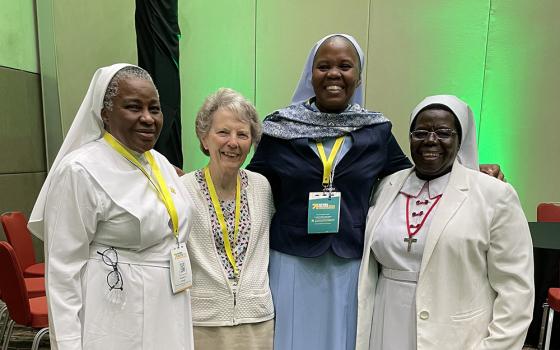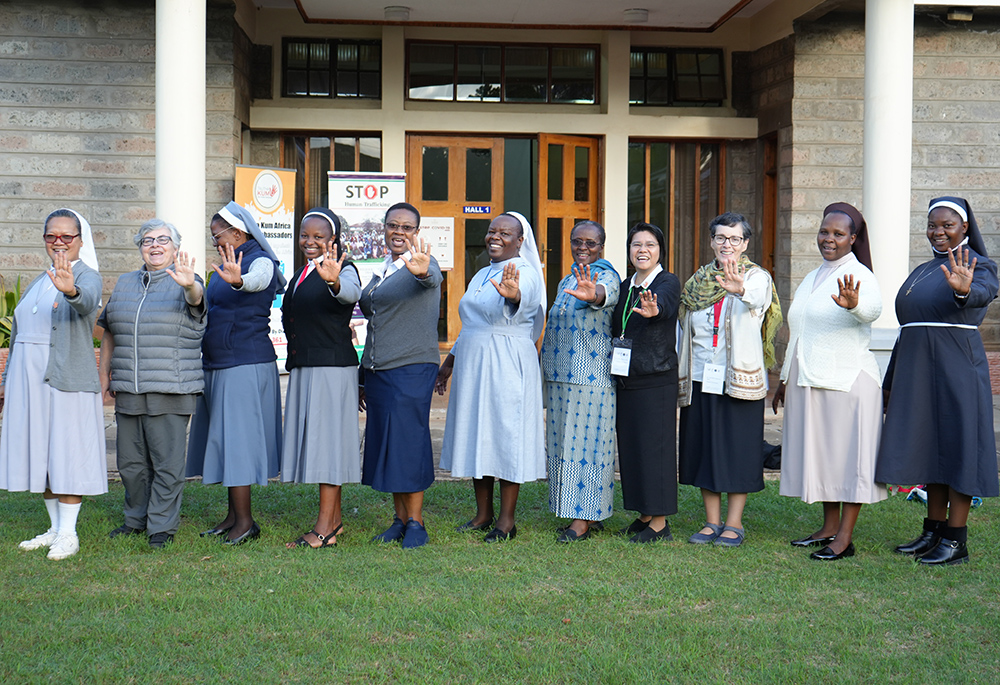
Attendees of the fourth Talitha Kum training course for leaders outside a conference hall at the Loreto Mary Ward Center in Nairobi, Kenya. This was the first ever international leadership training to be held in Africa since it started in 2018. The training workshop drew 22 attendees and five coordinators from around the world. (Wycliff Peter Oundo)
The fourth international edition of the Talitha Kum leaders course, held Nov. 20-27 at the Loreto Mary Ward Center in Nairobi, focused on imparting essential skills to international leaders to promote collaboration for preventing and creating awareness against the vice of human trafficking in Africa and the world.
The weeklong in-person session, held in the country's capital, also sought to provide necessary skills and knowledge to participants to support survivors of human trafficking and their families. The intensive one-year course will continue online to ensure attendees acquire the required leadership skills.
The course, which attracted 22 participants from 17 nations, the majority being religious sisters from 17 congregations, is in collaboration with the Tangaza University College (Nairobi) and the Pontifical University Antonianum (Rome).
"The workshop is open to all stakeholders and not just limited to sisters only," said Sr. Abby Avelino, a Maryknoll Sister who is also the international coordinator of Talitha Kum. "This year, our selection was focused on quality as opposed to quantity to ensure we directly impact and educate the future leaders of our networks. We aim to expand our networks in Africa, which is seeing an increase in human trafficking cases."
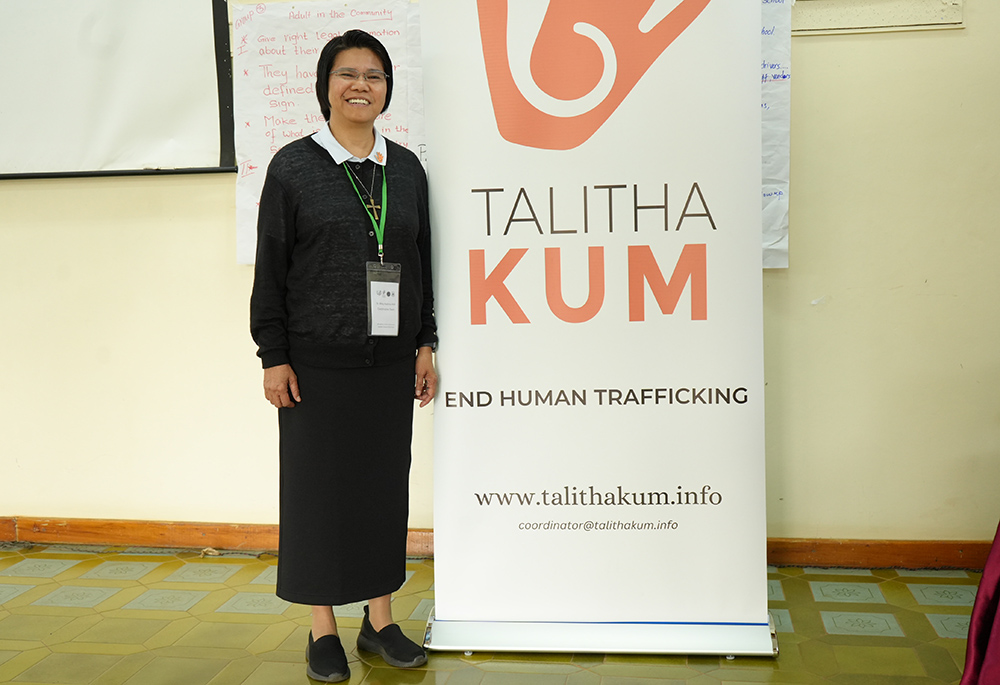
Sr. Abby Avelino of the Maryknoll Sisters attended the Nairobi edition of the Talitha Kum leadership training. She has been the international coordinator of Talitha Kum since September 2022. She is the third international coordinator of the network established by the International Union of Superiors General to combat human trafficking and support survivors. (Wycliff Peter Oundo)
Talitha Kum is an international network of Catholic sisters established in 2009 by the International Union of Superiors General, or UISG. Its name is inspired by the words of Jesus to Jairus' daughter, "Talitha koum" ("Little girl, I say to you, arise!"), as a call to the church, religious and the world to rise against human trafficking and support its victims. The organization is spread across nearly 90 countries with dozens of networks and is funded by donors such as the Conrad N. Hilton Foundation.
The Migration Data Portal, co-funded by the European Union, highlights a 2022 report on its website. According to the portal, the report "estimates that 50 million people were victims of modern slavery in any given day in 2021. Out of these, an estimated 27.6 million people were in situations of forced labor and another 22 million people were in a forced marriage."
Sr. Jane Wakahiu, associate vice president of program operations and head of Catholic Sisters at the Conrad N. Hilton Foundation, said religious sisters, who are a powerful force against human trafficking globally, work tirelessly in front-line roles to alleviate suffering and prevent exploitation of victims of human trafficking.
Wakahiu said that the Talitha Kum training course for leaders, started in 2018, is delivered onsite but also virtually, as the aim is for sisters to share ideas nationally, regionally and at continental levels. For the past five years, there have been three editions involving 83 participants and more than 20 teachers, formators and facilitators.
Advertisement
Wakahiu noted that the Conrad N. Hilton Foundation has been funding training and programs on human trafficking because it helps sisters to recognize the indicators of human trafficking and learn how to respond appropriately. (The foundation is also a major funder of Global Sisters Report.)
"We invest in strengthening sisters' capabilities, networks and skills to enable them to develop partnership, prevention, protection and survivor support initiatives," Wakahiu, a member of the Institute of the Little Sisters of St. Francis, Kenya, told Global Sisters Report.
"The program is anchored within Catholic social teaching, prioritizing human dignity, preferential options for the poor, and solidarity with survivors. It includes competencies for self-care for sisters who work in the frontline. They, too, need self-compassion to help them accompany the afflicted."
Wakahiu clarified the training enhances leadership skills for Talitha Kum members to collaborate and manage anti-trafficking activities. She said some course content encompasses leadership models, emerging realities on human trafficking, spirituality, networking, communication, project planning and development, advocacy, and fundraising.
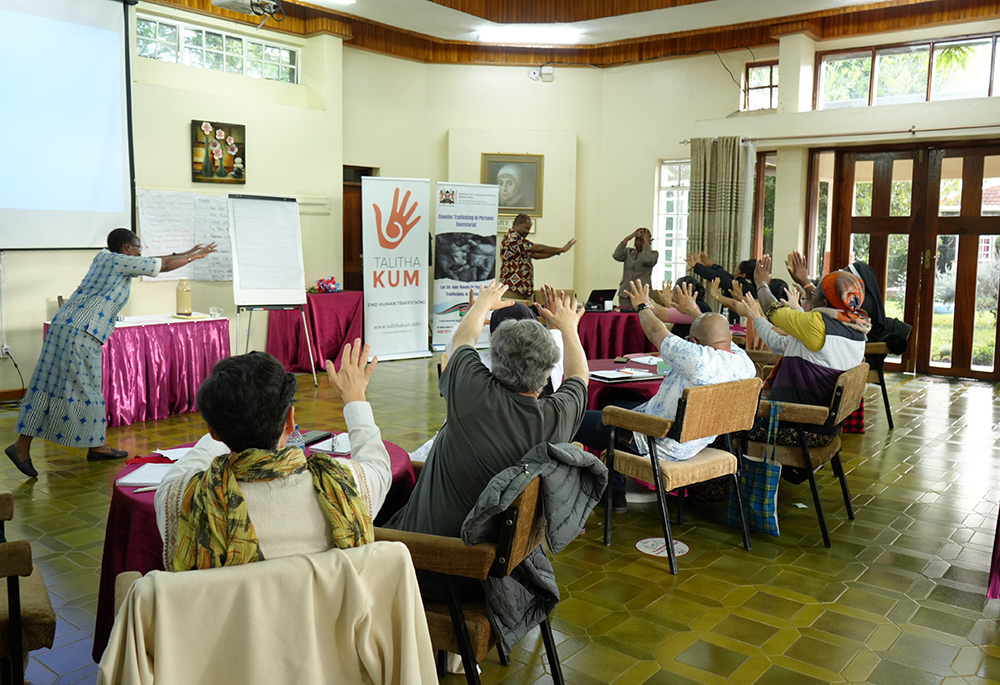
Sisters, lay persons, and Talitha Kum's national, regional, and international coordinators are pictured during a leadership session at the Loreto Mary Ward Center in Nairobi. (Wycliff Peter Oundo)
"Human trafficking is a cross-border issue and not just within a country. Sisters working in this space need to know and support each other, mainly when survivors are repatriated; they provide the needed support," she said.
Stefano Volpicelli, a sociologist and one of the trainers, said that at the end of the course, sisters would be able to overcome congregational and institutional limitations in order to implement human trafficking preventive systems with proper team management and communication skills.
"The Nairobi workshop is focusing on leadership training to bolster the scalability of national and regional networks," said Volpicelli, noting that participants are required to present their final thesis at the end of the course as proof that they can find solutions to specific situations on human trafficking.
After completing the course, he said, participants must work for at least three years with one of Talitha Kum's networks.
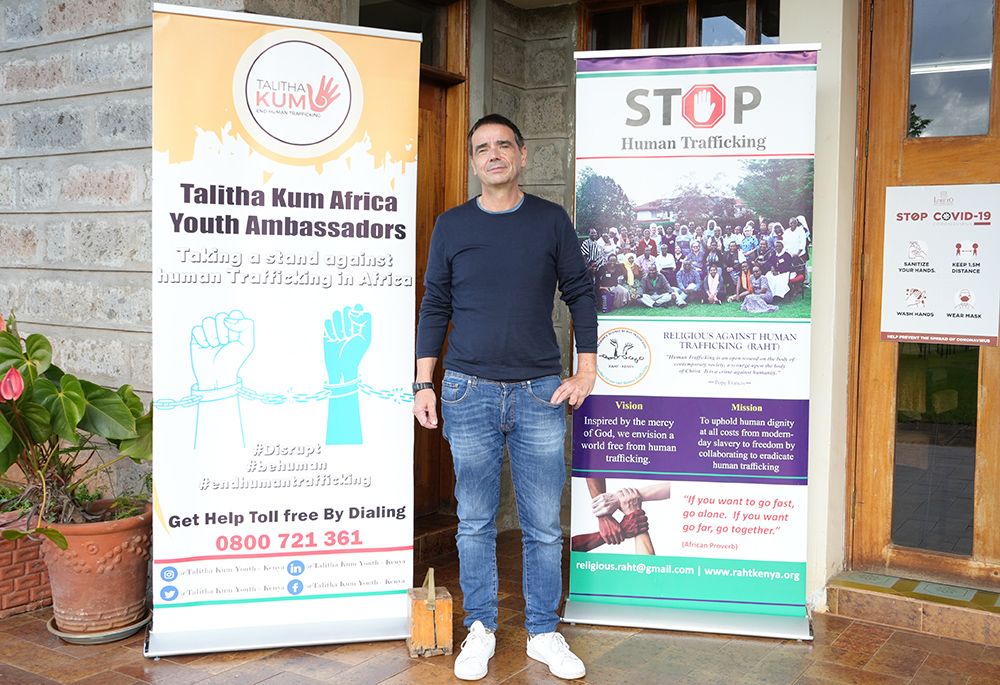
Italian professor Stefano Volpicelli served as one of the tutors at the Talitha Kum international leadership training in Nairobi, Kenya. He is one of the people who helped the International Union of Superiors General develop Talitha Kum and answer Pope Francis' call to end global human trafficking. (Wycliff Peter Oundo)
Meanwhile, Avelino said that although the international workshops are becoming more impactful in reducing human trafficking rates and strengthening the Talitha Kum networks, the coordinating teams face challenges in setting up international training.
"The language barrier is a big challenge because we have attendees from all over the globe, and we also face mobility challenges because not everyone can travel to some of our residential workshops," she said.
Still, Avelino lauded the successes of the international workshop, adding that it has set the pace for more regional and national training sessions.
"In this edition, we have seen more youth representation, which is an aim of Talitha Kum to get more young people involved and aware of human trafficking," she said. "We have noted more interaction, diversity and collaboration between attending networks. Most importantly, we are achieving increased visibility of Talitha Kum and its leadership training workshops, as we hope more countries will join our networks."





